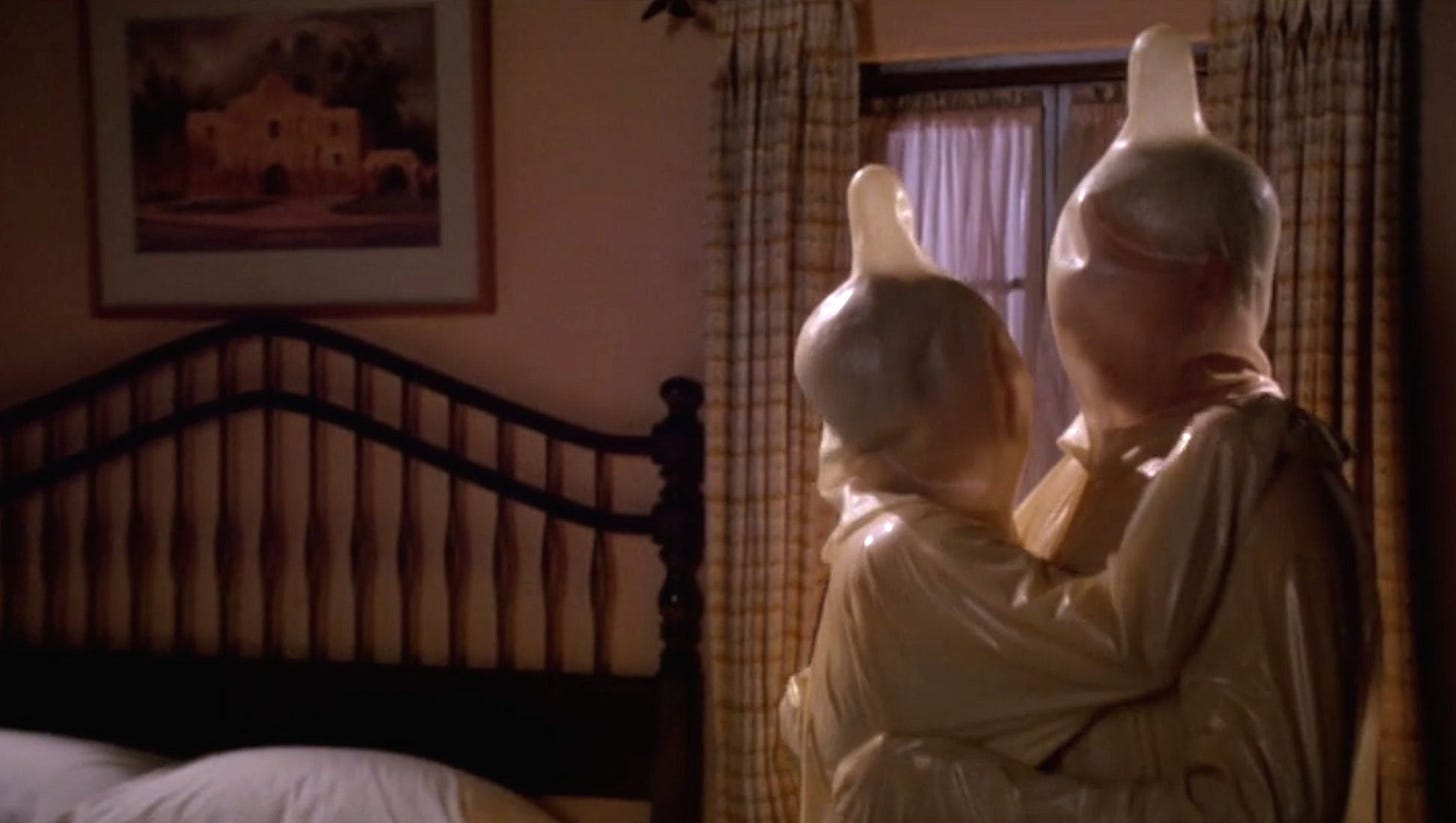The 25 year-old man who chastised his live-in girlfriend and gave her the silent treatment for "overstepping her boundaries" after she woke him up with a blowjob: does he even exist?
Many men have weighed in on this point, some of them quiet passionately! Good for them. Personally, my position is more of the who-knows-who-cares variety — although I could also muster some enthusiasm for "let's hope not", if only for the girlfriend's sake.
But: boundaries. These are interesting! Not the specifics thereof (again, I do not care what you personally prefer not to do in your bedroom, I wish you nothing but joy in the not-doing of it), but conceptually, as something people are increasingly very concerned about, and very vocal, often to the exclusion of all else.
I think this is a natural if unintended consequence of consent discourse, which has fueled a mass cultural consensus that harm avoidance is now the foremost principle of sexual encounters. It's not that I can't envision any sexual scenario in which boundary talk is a good thing. If you're into BDSM, or going poly after 25 years of marriage, or if your partner has a kink that you are willing to indulge but only to a very specific point, and discussing boundaries is going to make the difference between talking dirty about the thing as versus being, say, literally shat upon — then yes, for god’s sake, have the talk. If the stakes are genuinely high and the risks to your health and/or your relationship genuinely serious, precautions should be taken.
The rest of the time, though? I'm just not convinced that this is the best way to go about it, this paradigm in which the idea of articulating what you want, sex-wise, takes a backseat to the anxiety-fueled laundry list of all the things you don't want. Things you are afraid will happen. Things that, if they do happen, will (you have been reliably informed) render you damaged and traumatized for the rest of your days. The more people think and talk about sex exclusively in terms of boundaries, the more dangerous it seems, and the less it seems even remotely possible that it might also, at some point, be… y'know, fun?
Also: this goes double when you have not actually had sex before, which many of the young people at whom consent discourse is most enthusiastically aimed have not.
All told, "boundaries" just seems like not the best framework, not the proper spirit, in which to approach the physical act of love. Like so much therapeutic language, it creates the impression of a game with monumentally high stakes, all violations and triggers and trauma; it suggests that the moment you feel uncomfortable, it means something has gone terribly wrong. It makes you think, “minefield”, when you should be thinking something more like, I don't know, “rollercoaster”. Something that is basically safe even though it feels dangerous, and where that sensation of danger is part of the fun. The thing about exhilaration and terror: they're pretty much the same mix of emotional ingredients, just with the proportions slightly tweaked.
With all the usual caveats about no analogy being perfect, I do like this one. Sex and rollercoasters make similar demands on a person, which is to say, you have to be willing to be a little uncomfortable, a little vulnerable, in return for being thrilled. You have to trust it! Imagine a person whose concept of rollercoasters is primarily rooted in fear — who walks through the entrance of Disneyworld in a state of exhausted trepidation, who stayed up all night researching the maintenance schedules for every ride in the park, and who is nevertheless still googling "rollercoaster amputations how many per year" as he stands in line for Space Mountain.
That guy? That guy is not going to enjoy himself. He'll be too busy wondering if every jolt, every clank, every bone-rattling curve, is a harbinger of his imminent death.
Or, in the bedroom version of this, whether the surprise wakeup BJ from his live-in girlfriend constitutes some kind of traumatic violation.
There is such a thing as being so obsessed with safety that you get in the way of your own good time.





This is what happens when we keep sex in pop culture and remove the eros. Sexual encounters can now be depicted as sad or traumatic, but never, ever fun, and if they are, you'd best believe someone's gonna pay dearly for it. I'm pretty libertine, but I never agreed to delegate our collective sexual imagination to porn, and I think it needs to be reclaimed by other mediums. Romantic desire used to be the driving force of all kinds of stories, and that helped stoke our hopes for connection, relationships and yes, getting off. And the reality is, no matter how often we celebrate kinks and all those sexual orientations, we're a lot less comfortable when someone does anything physical about them. But I think the issue cuts even closer to the bone. Folks are allergic to making mistakes, hence all the chatter about rules and categories. And so much of the glory of romance involves the risk of being vulnerable, misunderstanding cues and getting rejected, and all that seems just too much for a generation raised on getting "likes" for every thought, meal and outfit.
I'm not sure whether the Internet/social media caused more people to be endlessly lost in their own heads or just gave them a vehicle to indulge getting lost in their own heads more than ever before. That might seem off-topic, but the whole surprise BJ story made me think of how in general a lot of people online seem to overthink every activity and suck the fun out of it (a non-sexual example would be the recent New Yorker article on "the case against travel").